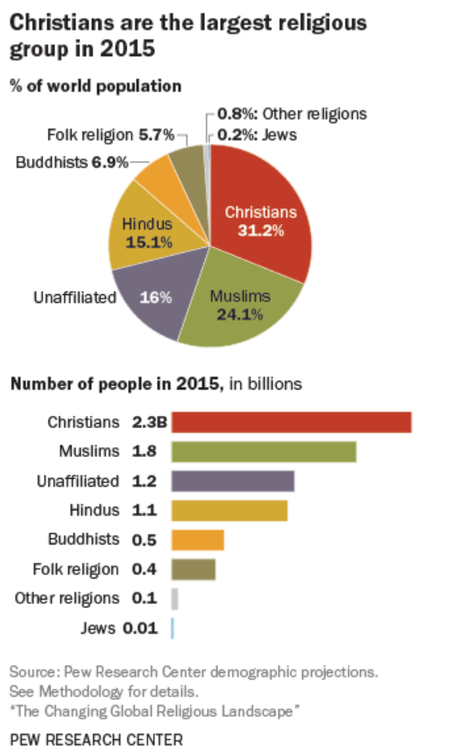
How does one know their exclusive belief claims are true? “Dear Believer: Why Do You Believe?”[1], is made by Plumbline Pictures and it poses this question. You can watch it here – Dear Believer: Why Do You Believe? (ORIGINAL) – YouTube.
It vividly portrays various religious beliefs and contrasts them with a narration that is grounded in secular humanism. It attempts to force us to confront the claimed irrationality of our religious beliefs. They quote Mark Twain, who apparently said, “the easy confidence with which I know another man’s religion is folly teaches me to suspect that my own is also.”[2]
So – how compelling is the secular humanist argument against “religion” in this video? More importantly, how effective is it in challenging the exclusive truth claims made by Christianity?
In the previous post, we responded to their claim that religious belief is accidental based on our place of birth, and so therefore has no truth content. This post moves on to objection two:
Objection 2 – All religious devotees think their beliefs are the only correct ones. What are the odds that you, dear believer, are correct and everyone else is wrong?
“There are 2 dozen major religions … [and] more than 45,000 denominations of Christianity alone, each claiming to understand ultimate truth better than the rest. Each member of every faith is just as devoted and sincere and convicted as you. Did you know they also read infallible texts, have airtight apologetics, have experienced miracles…? Yet since every religion is mutually exclusive, they cannot all be right, right? If every member of every faith feels just as you do, what are the odds you are right?”[3]
I think the narrator is right when claiming the major religions are mutually exclusive. This is correct. They all have different beliefs around whether there is a God, who God is and what his nature and character is, the role of human effort in one’s religious observance, etc. He is also right to point out the sincerity of religious belief amongst the believers of different religions.
However – there are also some very major problems with the rest of this argument.
First – the veracity of religious belief is not determined by the number of people who hold to this belief.
Just because there are many people with religious beliefs that contradict Christianity, this does not mean that Christian belief is rendered false. Greg Reeves describes this idea as the “popularity contest” view of religion.[4] If the narrator is saying that the most popular belief system with the highest number of adherents is the correct one, then he has missed the point of religious belief in general and Christianity in particular.
Think of this another way. The sincerity of one’s religious belief has nothing to do with the truthfulness of that belief. I can honestly and sincerely believe that I will receive a Bugatti Chiron sports car for Christmas. The ultimate correctness of that belief is a different thing compared to the sincerity of my belief. Sincerity and truthfulness are two different things. And – as I already said – religion is not a popularity contest where someone’s belief must necessarily be false if someone else believes something different. Not at all.
Second – the narrator’s claim actually turns out to be self-refuting.
The religious popularity contest idea is a big problem for atheism. Now – atheists are sincere people. I know many sincere atheists. And I know any sincere religious believers as well. But studies consistently show that atheism is a much rarer belief system amongst human beings than religious belief is. Or, if you like, atheism is much LESS popular than Christianity.
In a recent Pew Research study, the largest single religious group was found to be the Christian group, measured at 31.2% of the world’s population. Muslims are measured at 24.1%, yet their group is also the fastest growing religion in the world today. Hindus, Buddhists and the others make up 28.7%. The unaffiliated are measured at only 16% and growing much more slowly than most other religious groups. Only a percentage of that unaffiliated group will qualify as atheists.[5]

This data is fascinating, and it reflects badly for atheism on the “belief as a popularity contest” idea. Atheists accounts for a very small percentage of the world’s population. If belief is a popularity contest, the atheist should trade up for Christianity, a much more popular belief system!
What the atheist will usually tell you is that – it is the content of atheistic belief that matters, not the size of their group. Well – its no surprise that the Christian understanding is the same. In other words, the size of the group, and even the rate of growth, are not actually related to the truthfulness of anyone’s belief. That this video claims it is, is simply incorrect, and misrepresents atheists as well as religious believers.
There’s also a complaint being made by the secular humanist narrator in this video. He laments, there are so many religions out there, there are too many to pick the correct one. I’m much more likely based on the odds to pick the WRONG one, he claims! Well – if you are playing a game of “pin the tail on the donkey”, shutting your eyes, and picking a religion at random, then yes. That’s right. But I know no one who actually does this. This suggestion is absurd. I think that on the whole people think deeply about spiritual matters, atheists and religious devotees alike. There’s no random choice being made here. I think the narrator’s complaint turns out to be rhetoric that is pretty dismissive of the very atheistic belief system that is being espoused by the video.
Rather than complaining about the number of religions in the world, what the atheist must do according to Reeves is to marshal evidence and show that atheism is a better choice. Please convince me that atheism does a better job of explaining the world than Christianity does.[6]
Third – this objection actually contradicts with other claims made in the same video.
Think about the first objection I identified in the video. Previously, we noted that the narrator complained that religious belief was linked to one’s place of birth, and this makes religious belief to be accidental and of no real value. But if the narrator is correct that religion is a popularity contest, as this second objection supposes, then you would expect religious beliefs to be passed on to your descendants, and so you would expect to find religious belief to be linked to your birth place. In other words, objection 1 objects to the very grounds being assumed by the narrator in objection 2! Are you confused yet? This is very bad reasoning on the part of the secular humanist narrator.
Further, towards the end of the video, we hear that the correct way to form beliefs is through logical deduction and reasoning and scientific methods and testing of hypotheses. So – belief systems are not the popularity contest assumed by the narrator in this objection after all. And these objections are turning out to be contradictory – this points to poor quality arguments.
Fourth – the claims made by the narrator are inconsistent in various ways.
First – he claims all belief systems have airtight apologetics. But this statement makes no sense. All belief systems cannot all have airtight apologetics. Only the one single correct belief system can have this. The others will lack the strong and reasoned arguments that the airtight belief system has. Having studied various world religions including Christianity, I think Christianity has the best reasoned defence compared to all the others.
Second – he talks about all belief systems having infallible texts. Well – does atheism have infallible texts? That seems highly unlikely to me. All religions may claim to have infallible texts. The challenge is for the adherent to that religion to present well reasoned arguments that support this claim. I think the notion of an “infallible text” assumes that one of the religions is correct above all the others.
Summary
This objection turns out to misunderstand the nature of belief, and the measure of a belief’s truthfulness. Sincerity and believer group size are irrelevant to truthfulness. It also suggests people choose a random approach when coming to a set of worldview beliefs. This is an unreasonable – and unkind – view of people that should be strongly. challenged.
Next time, we will turn to the third objection. Christians are atheists too, just for one more god than the atheist.
[1] Dear Believer: Why Do You Believe? (ORIGINAL), Plumbline Pictures, posted 3rd May 2014, accessed 21st December, 2021, https://www.youtube.com/watch?v=xl_TrvIIcBY.
[2] Ibid.
[3] Ibid., 04:04.
[4] Greg Reeves, A response to “Dear Believer, Why Do You Believe?” part 1 of 2, accessed 21st December, 2021, https://twobooksapproach.blogspot.com/2012/11/a-response-to-dear-believer-why-do-you.html.
[5] The Changing Global Religious Landscape, Pew Research Centre, posted April 5th, 2017, accessed 24th December, 2021, https://www.pewforum.org/2017/04/05/the-changing-global-religious-landscape/.
[6] Reeves.
